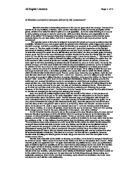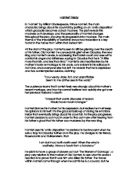Is Hamlet a coward or someone driven by his conscience?
Page of 2AS English Literature Is Hamlet a coward or someone driven by his conscience? Hamlet's character is interesting because of the way he goes about his revenge. Compared to Laertes he is very hesitant, a thinker, not a warrior. His delay is mainly due to his perception of the ghost, whether it is really his father's spirit or an evil apparition, but is he really thinking of an excuse to delay seeking revenge or does he want to be 100% sure King Claudius was responsible for the death of his father? The important thing that Shakespeare is trying to portray is that Hamlet seeks certainty before he can take action, but is he a coward? Or someone who is purely driven by his conscience? The opening scene of the play is designed to present the ghost and arouse questions about its credibility. Whether it is an evil or good spirit, the ghost is the mechanism which triggers the need for Hamlet's revenge. Hamlet's uncertainty about the identity and purpose of the ghost is highlighted in Act I scene IV, "Be thou spirit of health or goblin dammed”, hence the importance of his thought sequences in deciding whether or not the ghost was real and if not, is there a need to kill Claudius?To seek this revenge he would have to kill Claudius and his mother, for they are both guilty of having impure souls. But one of the very first internal conflicts Hamlet has is when the Ghost tells him (Act I scene IV) "nor let thy soul contrive against thy mother aught. Leave her to heaven…". This leaves him in great turmoil, as he can justify to himself the killing of Claudius, but not letting his mother live. He is so overcome with a sense of purity and morality, especially with concern to women, it does not seem right to him that
something so tainted should be allowed to carry on in the world. He wants his perfect revenge, one that would satisfy his meticulously accomplished conscience, but he is hesitant on whether he can carry it out or not, so instead he declines it altogether or at least puts it off in stages, until he can prove it to himself and can put it off no longer. He is willing to taint his own soul and so go to hell and enter a damnation possibly even worse than that in which the Ghost resides, which the Ghost tells Hamlet that it ...
This is a preview of the whole essay
something so tainted should be allowed to carry on in the world. He wants his perfect revenge, one that would satisfy his meticulously accomplished conscience, but he is hesitant on whether he can carry it out or not, so instead he declines it altogether or at least puts it off in stages, until he can prove it to himself and can put it off no longer. He is willing to taint his own soul and so go to hell and enter a damnation possibly even worse than that in which the Ghost resides, which the Ghost tells Hamlet that it would “harrow up thy soul, freeze thy young blood, make thy two eyes like stars start from their spheres" (Act I. scene IV). However, yet he is willing to suffer all this for the sake of revenge in killing Claudius, to avenge his father, so to save his mother, to "leave her to heaven" (Act I scene V), when even he is not allowed this blessing. What he is giving up to be the dutiful son and revenge his fathers murder in comparison to what Gertrude is giving up leaves him worse off than her, even though she has been an adulterous wife. Therefore her being allowed to live on in sin is as wrong not only on her part, but also on Hamlets for allowing it to be. These lines sum up the first act and also most of the play, as it is Hamlet questioning and delaying his revenge. However, in the final scene of act 1, Hamlet says he is to, 'sweep to my revenge' but the play is based on Hamlet not sweeping to his revenge but delaying his revenge. Act 2 is a short act as little happens other than the arrival of the actors. In the previous act Hamlet tells us that he is to put on 'an antic disposition' where he will pretend to be mad to attain more information about his father’s death. Hamlet becomes angry and disgusted with himself; he can't understand his own lack of passion, even after proving to himself that Claudius is guilty. He is very aware of himself not crying in the rehearsal of the play, when the players are moved to tears over the story of the "vengeance" (Act II scene II) of Pyrrhus, Priam and Hecuba. As soon as he is alone, he bursts out “O, what a rogue and peasant slave am I! Is it not monstrous that this player here, But in a fiction, in a dream of passion, Could force his soul so to his own; That from her working all his visage waned, Tears in his eyes, distraction in his aspect….And all for nothing" In Act 3 Hamlet has the chance to act on his revenge as he sees Claudius alone, he does not act because Claudius is praying and if he did kill him then he would go to heaven so Hamlet delays his revenge. In this act Hamlet contemplates suicide, 'To be, or not to be, that is the question' this soliloquy of Hamlet's is very philosophical as he asks whether it is better to be dead rather that to face the problems of life. In this soliloquy Hamlet claims that it is thinking which prevents us from action, 'Thus conscience does make cowards of us all,' could this be the reason for which Hamlet delays his revenge? Does Hamlet feel that he is too much of a thinker and his life is so complicated that he cannot sweep to his revenge? Is this the reason that Hamlet holds for his reluctance to react? Is Shakespeare saying that it is a flaw in someone's character to think his or her actions through logically beforehand? Also in this act Hamlet destroys his relationship with women furthermore when he confronts Ophelia he tells her, 'Get thee to a nunnery.' As if to call her a prostitute, however Hamlet could be telling her this to get her to seek refuge and save her from the corruption in the society around them. Hamlet feels miserable at his deficit of showing no emotion, he is forced to compare himself and he comes of worse. "What would he do had he the motive and the cue for passion that I have? …Make mad the guilty and appal the free". He again feels this lack of justified fervour when young Fortinbras goes to battle to fight and possibly to die for a land that is acknowledged to be not worth the sacrifice. This is again someone showing emotion and action when there is not as much reason to do so as there is for Hamlet. When he is alone he sees what Fortinbras has done as being honourable and a rebuke of his own inaction, whereas before when talking to Fortinbras' captain, he had been cynical as to the actions they were carrying out. He sees his need to think things through before acting as a deplorable weakness. Even he can see that he is being weak minded and indecisive. But even when convinced he can't kill his uncle deliberately. Claudius being a murderer and committing incest and yet still having the crown of Denmark and outwardly appearing to be just, honourable and a good leader could explain why Hamlet often confuses the order of society in his speeches. This can be seen when he calls himself a "rogue and peasant slave" (Act II scene II) when he clearly isn't. To Hamlet, Claudius is tainted and impure in mind and action, yet he is a good ruler of Denmark, a good king, and a good diplomat. He is efficient, confident, in control of affairs, in every way assured and poised. Hamlet identifies with Claudius in a way that restrains him from being able to kill him, hamlet has all the ability and the necessary desire, but Claudius has everything Hamlet wants, which leads to internal sub-conscious conflict on as well as his conscious conflicts. His mother's ability to alter the direction of her affection from one person to another so suddenly hurts Hamlet, as having to share her with his own father was difficult enough, but at least was understandable. He is now jealous that someone else holds such high regard in her affections but at the same time is disgusted with her for loving someone else. But as his jealousy is repressed, as he doesn't even admit to himself that he is jealous of his mother's lovers, all he feels is a deep sense of disgust towards Gertrude that helps him deal with his rejection. Therefore Hamlet could be suffering from the theory that Freud developed. The Oedipus theory, this states that as children, young boys feel great bitterness and resentment towards their fathers for making them share their mothers affections and for having sexual relations with their mothers which the young boys also desire, and so they view their fathers as rivals that they would rather have out of the way. These thoughts are repressed as a form of defence for fear that their fathers will realise what they are thinking. Concluding, is Hamlet really a coward? Does he not believe the ghost? Or did he not wish to strike Claudius whilst he was praying? In my opinion I believe Hamlet is a very thorough thinker, He tries to carry out the task, but he is held back in some way, because he cannot kill a person who he recognises as so like himself in what he wants to be like and wishes he could do. His desires towards his mother have been so long repressed that they are now repulsive to him, but yet her remarrying brings those thoughts to his attention. He sees someone taking the place of his father in her affections, the place that he has long coveted. When Hamlet discovers the identity of his father's murderer his first instant reply is "O my prophetic soul! My uncle?" (Act I scene V). This does imply that unconsciously the idea had been in his mind and had suddenly been brought back to his awareness.








